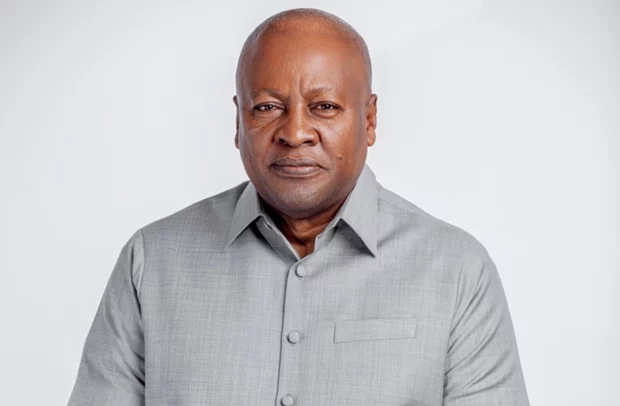President John Mahama
IMANI Africa says the early goodwill from the “Resetting Ghana” agenda that initially clothed the Mahama administration has been eroded by governance contradictions, selective justice, mass dismissals, the controversial use of private jets, and doubts over the anti-corruption drive, Operation Recover All Loot (ORAL).
In a report produced under its Public Understanding and Literacy for Sentiment and Election Analysis (PULSE) project, the policy think tank stated that optimism following President John Dramani Mahama’s swearing-in in January 2025 has since given way to scepticism, controversy, and disappointment.
According to IMANI, findings from the report – which tracked social and traditional media discourse over the government’s first six months, analysing more than 23,000 mentions with a reach of 315 million interactions – show that the Mahama administration began with strong public approval.
It pointed out that the launch of the #ResettingGhana agenda and the historic swearing-in of the nation’s first female Vice President created widespread excitement.
IMANI noted that between January and February, positive sentiment stood at about 65 to 70 percent, buoyed by austerity measures such as scaling down Independence Day celebrations and the establishment of an anti-corruption task force.
However, the think tank stressed that by March, the administration’s credibility, “the most valuable political currency” in the country’s fast-moving media space, was already facing its first major test.
The ‘Terminator 1’ Effect
The report indicates that the National Democratic Congress (NDC) government’s decision to revoke public sector appointments in what it described as a clean-up exercise, triggered an intense backlash.
Although the scrapping of unpopular taxes such as the E-levy and betting tax won public approval, mass dismissals overshadowed those gains, IMANI added.
“Social media quickly branded the President ‘Terminator 1,’ a label that went viral and fuelled anxiety among civil servants and young professionals. Dismissals created the strongest wave of negative sentiment in the period under review,” the report states, noting that many Ghanaians perceived the exercise as politically motivated.
Private Jet Scandal
IMANI observed that the Mahama administration’s fiscal prudence narrative suffered a blow between April and May, when revelations about the President’s reliance on his brother’s private jet for official trips contradicted earlier promises of austerity.
The situation deepened in June when the Vice President also used a private jet during a medical emergency abroad.
“These incidents gave the opposition a powerful narrative of hypocrisy,” the report notes, adding that online discourse was dominated by memes, before-and-after comparisons of the NDC’s previous criticisms of private jet usage, and clips of opposition Members of Parliament (MPs) attacking the government’s double standards.
“Despite international business forums and economic diversification initiatives, the private jet controversy became a symbol of inconsistency and eroded the administration’s moral high ground,” the report adds.
ORAL and Selective Justice
The government’s flagship anti-corruption campaign, Operation Recover All Loot (ORAL), has also struggled to maintain public confidence.
IMANI said initially popular for its promise to prosecute corruption and recover assets, ORAL is now widely criticised for alleged political bias.
It highlighted that cases involving key NDC figures, including Collins Dauda in the Saglemi Housing project and Dr. Cassiel Ato Forson in the ambulance procurement case, were dropped, while prosecutions targeting opposition officials such as Chairman Wontumi and Adu-Boahene were aggressively pursued.
The result, according to the report, was 85 percent negative sentiment around “Rambo-style arrests” and growing fears of democratic backsliding. Civil society organisations also warned against the weaponisation of state institutions for partisan ends.
Goodwill Lost
By June, negative sentiment had overtaken positive perceptions, standing at 50 percent against 45 percent. Allegations of selective justice, persistent job dismissals, and the private jet scandals combined to overshadow positive initiatives such as a mining summit and fiscal reforms.
Even within the NDC’s base, IMANI detected signs of disappointment and disillusionment. The report also reveals that opposition hashtags outperformed government messaging, while viral memes portraying Mahama as “The Terminator” amplified negative narratives up to four times more effectively than official communications.
A Path to Recovery?
IMANI recommended that the Mahama administration urgently address perceptions of selective justice by publishing transparent prosecution criteria and ensuring equal treatment across political divides. It also called for reforms to security operations to eliminate militarised arrests and for greater consistency between rhetoric and action.
“Without tangible delivery on jobs, cost of living, and anti-corruption, the administration risks losing more than goodwill; it risks losing trust,” the think tank cautioned.
The report concludes that while the NDC government started on a wave of hope, its credibility has been chipped away by contradictions.
To regain public confidence, IMANI argues, the government must “match rhetoric with delivery, avoid hypocrisy, and engage citizens with transparency.”
A Daily Guide Report


